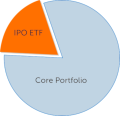The US IPO market has gradually rebounded in 2024, with proceeds up 61% from this point last year, but that momentum has not materialized within venture-backed tech. That should soon change, as strong returns from the year's VC-backed tech IPOs point to more activity in 2025.
So far this year, only five tech IPOs have come to market with venture backing, an increase from the prior two years but well below the 10-year historical average (23 IPOs). The five average a very strong 73% return from offer, above both the broader group of sizable tech IPOs this year (+46%) and all $100+ million 2024 IPOs (+32%).
To access exclusive content, IPO alerts, data screens, and enhanced profiles, sign up for a free trial of IPO Pro, the platform that gives you all of the IPO information you need, all in one place.
Social media platform Reddit (RDDT) and chipmaker Astera Labs (ALAB) lead with triple-digit gains, boosted by growing interest in AI, an angle that both pitched heavily in their IPOs. Data management firm Rubrik (RBRK) has seesawed since its listing but is currently up following a rally in early October. Digital rebate platform Ibotta (IBTA) has spent a majority of its time as a public company below issue, though it has recovered somewhat from its August low. The most recent on the list, China-based autonomous driving play WeRide (WRD) has hovered around its IPO price.

The VC-backed tech rally isn't limited to 2024 IPOs, either, with 2023 listings Klaviyo (KVYO) and Instacart (CART) up 50% and 30%, respectively, over the past three months.
Despite that strong performance, private VC-backed tech companies have stayed on the sidelines. The typical fall pickup was dampened by the upcoming US Presidential election, but valuations have been the main sticking point for private tech unicorns during the past three years. Facing potential down-rounds, VCs decided to hold out for higher valuations while collecting management fees, using secondary markets to access some liquidity. Still, calls for an exit have grown louder as valuations have risen in the past year.
And while valuation discipline has paid off for investors, strong returns from the recent class should make them more flexible if presented with the right growth story. In short, we expect investors and issuers to finally meet in the middle in 2025 and onward.
The public pipeline provides little visibility for notable tech issuance, though two recent filers, AI-focused chipmaker Cerebras Systems (CBRS) and China-based robotaxi developer Pony AI (PONY), should both be sizable listings. Instead, next year's most notable tech deals are likely waiting to make their confidential filings public.


